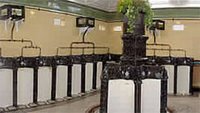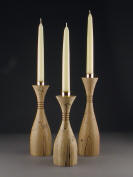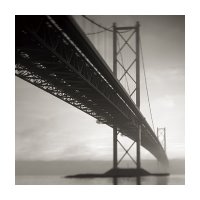

Tam o’ Shanter (CLICK LINKS FOR TRANSLATION/EXPLANATION)
by
Robert Burns
When chapman billies leave the street, And
drouthy neibors, neibors, meet; As market days are wearing late, And folk begin to
tak the gate, While we sit bousing at the nappy, An' getting fou and unco happy, We think na on the lang Scots miles, The mosses, waters, slaps and stiles, That lie between us and our hame, Where sits our sulky, sullen dame, Gathering her brows like gathering storm, Nursing her wrath to keep it warm. This truth fand honest Tam o' Shanter, As he frae Ayr ae night did canter: (Auld Ayr,
wham ne'er a town surpasses, For honest men and bonie lasses). O Tam! had'st thou but been sae wise, As
taen thy ain wife Kate's advice! She tauld thee
weel thou was a skellum, A blethering, blustering, drunken blellum; That frae November till October, Ae market-day thou was na sober; That ilka
melder wi' the Miller, Thou sat as lang as thou had siller; That ev'ry
naig was ca'd a shoe on The Smith and thee
gat roarin' fou on; That at the Lord's house, ev'n on Sunday, Thou drank wi' Kirkton Jean till Monday, She prophesied that late or soon, Thou wad be found, deep drown'd in Doon, Or catch'd wi' warlocks in the mirk, By Alloway's auld, haunted kirk. Ah, gentle dames! it gars me greet, To think how mony counsels sweet, How mony lengthen'd, sage advices, The husband frae the wife despises! But to our tale: Ae market night, Tam had got planted unco right, Fast by an ingle, bleezing finely, Wi reaming sAats, that drank divinely; And at his elbow, Souter Johnie, His ancient, trusty, drougthy crony: Tam
lo'ed him like a very brither; They had been
fou for weeks thegither. The night drave on wi' sangs an' clatter; And aye the ale was growing better: The Landlady and Tam grew gracious, Wi' favours secret, sweet, and precious: The
Souter tauld his queerest stories; The Landlord's laugh was ready chorus: The storm without might
rair and rustle, Tam did na
mind the storm a whistle. Care, mad to see a man sae happy,
E'en drown'd
himsel amang the nappy. As bees
flee hame wi' lades o' treasure, The minutes wing'd their way wi' pleasure: Kings may be blest, but Tam was glorious, O'er a' the ills o' life victorious! But pleasures are like poppies spread, You seize the flow'r, its bloom is shed; Or like the snow falls in the river, A moment white-then melts for ever; Or like the Borealis race, That
flit ere you can point their place; Or like the Rainbow's lovely form Evanishing amid the storm. - Nae man can tether Time nor Tide, The hour approaches Tam maun ride; That hour, o' night's black arch the key-stane, That dreary hour he mounts his beast in; And sic a night he taks the road in, As ne'er poor sinner was abroad in. The wind blew as 'twad
blawn its last; The rattling showers rose on the blast; The speedy gleams the darkness swallow'd; Loud, deep, and lang, the thunder bellow'd: That night, a child might understand, The
deil had business on his hand. Weel-mounted on his grey mare, Meg, A better never lifted leg, Tam skelpit on thro'
dub and mire, Despising wind, and rain, and fire; Whiles holding fast his
gude blue bonnet, Whiles
crooning o'er some auld Scots sonnet, Whiles glow'rin round wi' prudent cares, Lest bogles catch him unawares; Kirk-Alloway was drawing nigh, Where ghaists and houlets nightly cry. By this time he was cross the ford, Where in the
snaw the
chapman smoor'd; And past the birks and meikle stane, Where drunken Charlie
brak's neck-bane; And thro' the whins, and by the cairn, Where hunters
fand the murder'd bairn; And near the thorn,
aboon the well, Where Mungo's
mither hang'd hersel'. Before him Doon pours all his floods, The doubling storm roars thro' the woods, The lightnings flash from pole to pole, Near and more near the thunders roll, When, glimmering thro' the groaning trees, Kirk-Alloway seem'd in a bleeze, Thro' ilka
bore the beams were glancing, And loud resounded mirth and dancing. Inspiring bold John Barleycorn! What dangers thou canst make us scorn! Wi' tippenny, we fear nae evil; Wi' usquabae, we'll face the devil! The
swats sae ream'd in Tammie's noddle, Fair play, he car'd na deils a boddle, But Maggie stood, right
sair astonish'd, Till, by the heel and hand admonish'd, She ventur'd forward on the light; And, wow! Tam
saw an
unco sight! Warlocks and witches in a dance:
Nae cotillon,
brent new frae France, But hornpipes, jigs, strathspeys, and reels, Put life and mettle in their heels. A
winnock-bunker in the east, There sat auld Nick, in shape o' beast; A towzie tyke, black, grim, and large, To
gie them music was his charge: He screw'd the pipes and gart them skirl, Till roof and rafters a' did dirl. - Coffins stood round, like open presses, That shaw'd the Dead in their last dresses; And (by some devilish
cantraip sleight) Each in its
cauld hand held a light. By which heroic Tam was able To note upon the
haly table, A murderer's banes, in gibbet-airns; Twa span-lang, wee, unchristened bairns; A thief, new-cutted
frae a rape, Wi' his last gasp his gabudid gape; Five tomahawks, wi' blude red-rusted: Five scimitars, wi' murder crusted; A garter which a babe had strangled: A knife, a father's throat had mangled. Whom his ain son of life bereft, The grey-hairs yet stack to the heft; Wi'
mair of horrible and awfu', Which even to name wad be unlawfu'.Three lawyers tongues, turned inside oot,Wi' lies, seamed like a beggars clout,Three priests hearts, rotten, black as muck,Lay stinkin, vile in every neuk.As Tammie glowr'd, amaz'd, and curious, The mirth and fun grew fast and furious; The Piper loud and louder blew, The dancers quick and quicker flew, The reel'd, they set, they cross'd, they cleekit, Till ilka carlin
swat and reekit, And
coost her
duddies to the wark, And linkit at it in her sark! Now Tam, O Tam! had they been queans, A' plump and strapping in their teens! Their sarks, instead o'
creeshie flainen, Been snaw-white seventeen
hunder linen!-
Thir breeks o' mine, my only pair, That
ance were plush o'
guid blue hair, I wad
hae gien them off my hurdies, For ae
blink o' the bonie burdies! But wither'd beldams,
auld and droll,
Rigwoodie hags wad
spean a foal, Louping
an' flinging on a crummock. I wonder did na turn thy stomach. But Tam kent what was what fu' brawlie: There was ae winsome wench and
waulie That night enlisted in the core,
Lang after ken'd on Carrick shore; (For mony a beast to
dead she shot, And perish'd mony a
bonie boat, And shook
baith meikle corn and bear, And kept the country-side in fear); Her
cutty sark, o' Paisley harn, That while a lassie she had worn, In longitude tho' sorely scanty, It was her best, and she was vauntie. Ah! little ken'd thy reverend grannie, That
sark she
coft for her
wee Nannie, Wi
twa pund Scots ('twas
a' her riches),
Wad ever grac'd a dance of witches! But here my Muse her wing
maun cour,
Sic flights are far beyond her power; To sing how Nannie
lap and flang, (A
souple jade she was and strang), And how Tam stood, like
ane bewithc'd, And thought his very
een enrich'd: Even Satan glowr'd, and fidg'd
fu' fain, And
hotch'd and blew wi' might and main:
Till first ae caper,
syne anither, Tam
tint his reason a thegither, And roars out, "Weel done, Cutty-sark!" And in an instant all was dark: And scarcely had he Maggie rallied. When out the hellish legion sallied. As bees
bizz out wi' angry fyke, When plundering herds assail their byke; As open pussie's mortal foes, When, pop! she starts before their nose; As eager runs the market-crowd, When "Catch the thief!" resounds aloud; So Maggie runs, the witches follow, Wi' mony
an eldritch skreich and hollow. Ah, Tam! Ah, Tam! thou'll
get thy fairin! In hell, they'll roast thee like a herrin! In vain thy Kate awaits thy comin! Kate soon will be a woefu' woman! Now, do thy speedy-utmost, Meg, And
win the key-stone o' the brig;
^1 There, at them thou thy tail may toss, A running stream they dare
na cross. But
ere the keystane she could make, The
fient a tail she had to shake! For Nannie, far before the rest, Hard upon noble Maggie prest, And flew at Tam
wi' furious ettle; But little wist she Maggie's mettle!
Ae spring brought off her master hale,
But left behind her
ain grey tail: The
carlin claught her
by the rump, And left poor Maggie scarce a stump. Now,
wha this tale o' truth shall read,
Ilk man and mother's son, take heed: Whene'er to Drink you are inclin'd, Or Cutty-sarks
rin in your mind, Think ye may buy the joys o'er dear; Remember Tam
o' Shanter's mare.









